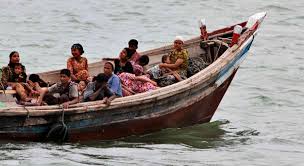BANDA ACEH — Muhammad Zubair felt like being born again when a boat carrying him and nearly 200 fellow Rohingya Muslims finally landed on Indonesia shores after weeks of being stranded at sea.

Many of the Rohingya Muslims who arrived safely
in Indonesia bore abuse scars, broken bones and skin injuries afflicted on them by Thai authorities.
Indonesian officials said the Rohingya refugees were in desperate conditions.
"The Thai military officers put us on the boat and kicked us out to the sea without sufficient food," Zubair, one of the Rohingya refugees, told IslamOnline.net at Idi General Hospital in Indonesia’s Eastern province of Aceh.
He and 198 ailing Rohingyas, some in critical condition, sailed into the most-western part of Indonesia’s coastline Sabang island in Aceh province on February 3.
"We departed from our hometown on December 18 in six boats," recalled Zubair.
"I don’t know what happened to the three other boats."
A first boat with 193 Rohingya refugees on board reached Aceh shores on January 7.
The two boats are believed to have been among many carrying about 1,200 Rohingya who fled persecution back home and landed on Thai shores late last year.
Hundreds of them were feared to have drowned after the Thai military dumped as many as 10 wooden boats far out to sea with no motors and hardly any provisions.
Besides the two boats that came to Indonesia, three arrived in India and one in Thailand.
The three other boats are unaccounted for.

Many of the Rohingya Muslims who arrived safely
in Indonesia bore abuse scars, broken bones and skin injuries afflicted on them by Thai authorities.
"They were beating me by a stick," Hussein Ahmad, one of the survivors, told IOL, sitting in his bed at the Aceh hospital.
Inhumane
Indonesian officials said the Rohingya refugees were in desperate conditions.
"When they saw our patrol, they suddenly jumped into the sea like hungry fishes and swum toward our boat," Lieutenant Teddy Junaedi, the patrol duty commander from Indonesian Navy, told IOL.
Fishermen and local residents joined the Navy in helping the group.
"Local residents took some of the refugees to their homes," Lieutenant Teddy said.
Some of them collapsed and cried as they stepped on the land for the first time in weeks. Many of them had to be rushed to hospital immediately.
The merciful treatment Rohingya Muslims found in Indonesia was something they never had at home, maintains Zafar Ahmead, president of Ethnic Rohingya Human Right Organization Malaysia.
"They experience systematic abuse from the junta," Zafar told IOL, putting the Rohingya population at about 3.5 million, two million of them still inside Myanmar while the others have fled.
Rohingya Muslims are believed to be descended from Arab and other Muslim traders who traveled and settled in the area more than 1,000 years ago.
They live in the mountainous northern Rakhine state, one of the poorest and most isolated in Myanmar.
Rohingya Muslims have been denied citizenship rights since an amendment to the citizenship laws in 1982 and are treated as illegal immigrants in their own home.
"They cannot do anything without permission from the Myanmar authorities, even for moving to a neighboring town or getting married," explains Zafar.
They are required to get official permission before marriage and the marriage approval can take two years or more.
Rohingya Muslim couples must sign a commitment not to have more than two children.
The survivors accuse the military authorities in the mainly Buddhist country of trying to force them to embrace Buddhism.
Many said authorities chopped their fingers off if they tried to pray.
Zafar says that this litany of abuse and harassment has and continues to push more Rohingya Muslims to flee Myanmar.
"They are treated badly and very inhuman, so they have to run away."
No comments:
Post a Comment